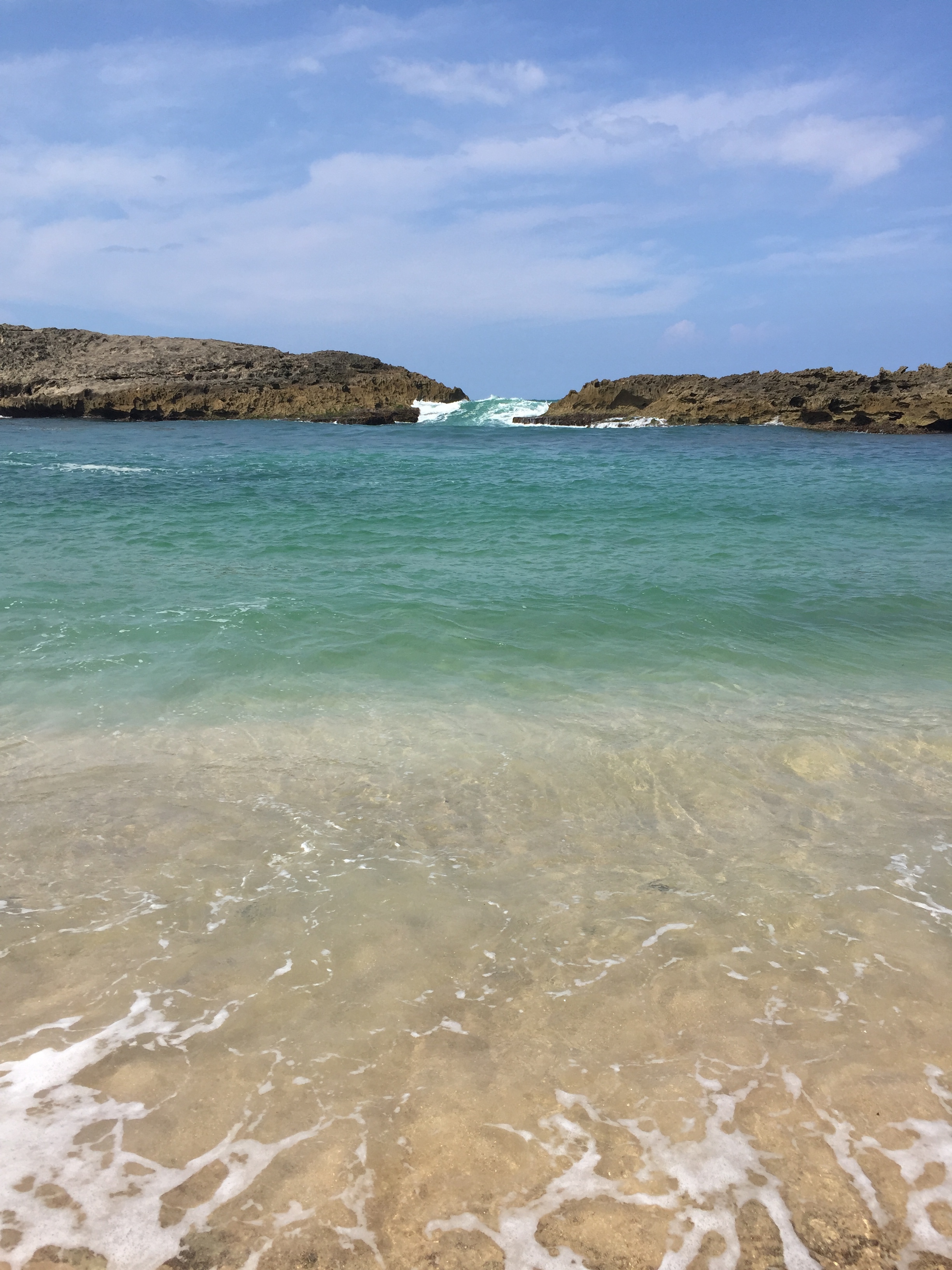“She will call you by your ancient name, and you will answer because you will not have forgotten. Water always remembers.” [m. jacqui alexander, pedagogies of crossing]
48 weeks ago i was floating in the water on the edges of the beach in piñones. this is not a photo of piñones. there, in the midst of the green-blue waters [which uncannily matched my nail polish], i was struck with a familiar dissonance.
i had felt it two weeks prior while i was driving up to el yunque with a beloved writer from equatorial guinea and her partner. she was in awe of how much el yunque reminded her of her own atlantic ocean island, how it looked like home. as we jumped in and out of the car at various points to look at the lush vegetation, the crawling creeks, and gushing waterfalls, a dizzying feeling coursed through me. not the kind of vertigo par for the course when trudging up mountains but a kind of pall. for a brief moment i saw them. i recognized myself as an extension of them, my ancestors, who were fully present in that forest. i felt of the earth then. i saw shadows of a present past. se me pararon los pelos.
a week later i was visiting la iglesia nuestra señora del rosario in my father's pueblo, vega baja. i traveled there in an attempt to track down family records. i arrived with a series of facts and little else: my father was raised by his grandmother born in the late 1860s or early 1870s - before slavery was abolished on the island in 1873. i knew his mother had worked tobacco but the town was best known for pineapple and sugarcane: la ciudad del melao melao. none of those facts mattered because when i asked to access the baptism and marriage records i was told that years 1794-1950 were off-site being digitized. skeptical, i went again a few days later but was told the same thing: the records were not there. the archives disappeared. someone suggested i try sevilla. they suggested that i cross the ocean to find my family whose land i was standing on at that very moment. i felt pulled to the earth. i felt desterrada. the dissonance, me tumbo.
as a consolation for my failure at the church, my my aunt took me to mar chiquita in manatí. this is a photo of mar chiquita. i pulled up my jeans to my knees and walked into the water. the atlantic lapped at my feet then solto una ola that crashed against my thighs. una bendición. i remembered vega baja beach, a littoral space that holds the memory of my father. i remembered tomas de castro and the wild farming my family has done on the side of the mountain. i felt pulled down. a present past.
somewhere in my basement i have photos of our last family trip to vega baja in 2005. papi, in the throes of the cancer that would spread to kill him, smiles broadly in the photos. he was so proud that he was able to afford to bring us all out to the island for a month-long stay. he took us to vega baja beach almost everyday and told us stories of his youth there, how he would jump off the oft-photographed cliffs into the atlantic. in retrospect, the trip was a kind of goodbye. i have not returned to that beach in vega baja since. i am haunted by those waters, i am choked by what they demand of me. a reckoning. instead i continually seek other black waters.
48 weeks ago in the blue-green waters of piñones i meditated on these losses. the disappearing archives. the archive of disappearances that taunt me with an indifferent: you will never know. i snapped a photograph to remember the moment and the feeling. i uploaded it to instagram and wrote this caption:
it's a beautiful overwhelming feeling to be on my land. everyday i am struck with waves of joy and grief. everyday i try to find and touch what that feeling is. almost everyday it leads me to the beach. it leads me to search church records [frustrating and futile]. it leads me to think about my hands, my bones, my skin and kin. more time. there is a reckoning. i ask the waters, the trees, the boughs: do you remember me? do you remember papi? and my people, do you remember them? i beg in whisper: tell me something about them. did they know that i'd love them? that i'd be tied to this land? that i'd go crazy searching for traces of them?
i had been called by my ancient name.
i am called again now. in the wake of huracán maria which has wreaked havoc on our island whose infrastructure was so weak it could only be by design. there was a crisis before this crisis. there was a want before the need and a need before that. we the reaped stand to witness the aftermath from afar. every effort too small. i tend to think that diasporicans are like a moth to a flame when it comes our homeland. we are pulled, hailed, and simultaneously torn away. desterradxs.
what does it mean to be a colonial subject torn from our home and pulled to it - like the many waves of the atlantic? what does it mean to be erased, disappeared from the archive? colonial subjectship is soul destroying. maddening. enraging. it is the present past. a mind fuck. what's worse is that the veil of ongoing colonialisms can be so thick that at times like these it is hard to see a way out. but there are cracks. there are ruptures. so we write and resist in/through these ruptures. we search for the disappeared and hold fast to the disappearing. we labor to remember. we we are more than colonial subjects. always more.
